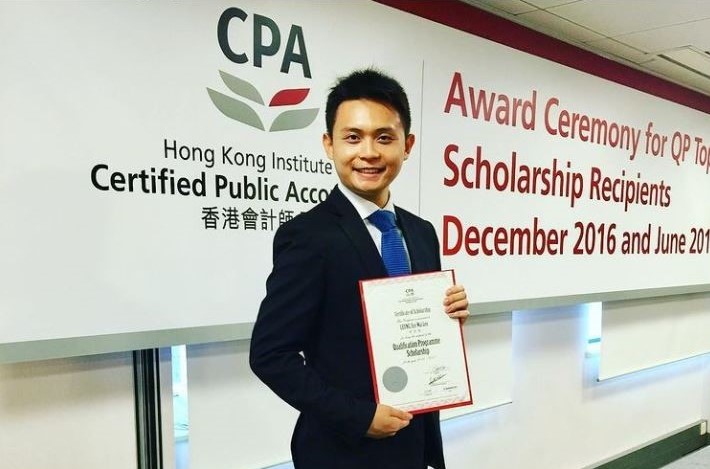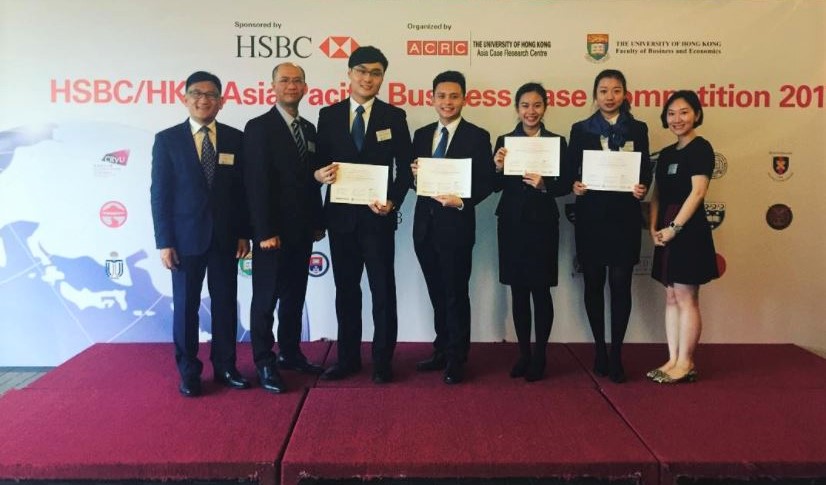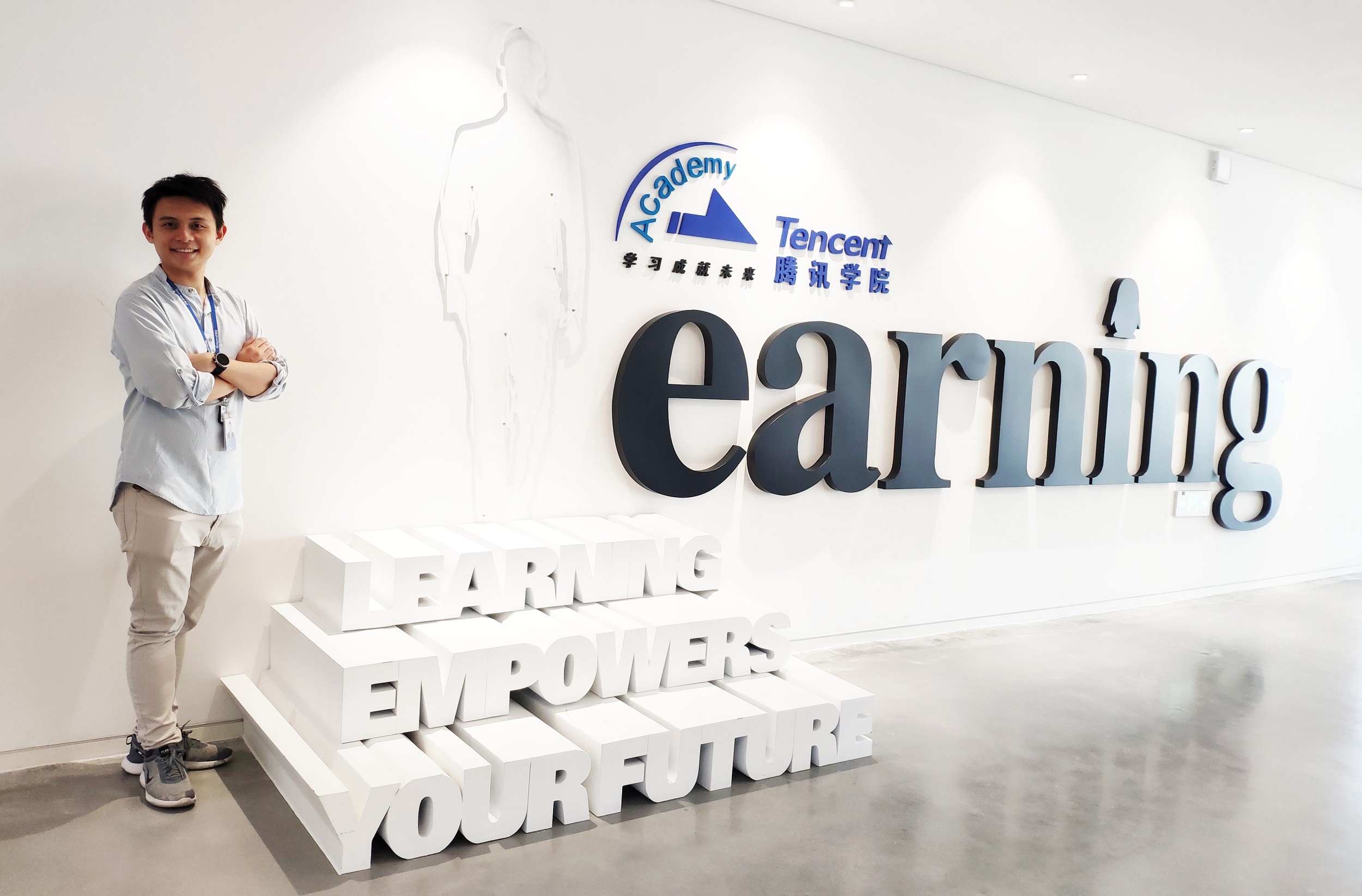People・Inspiration
HKBU has nurtured over 140,000 graduates since its inception in 1956 and a lot of alumni have inspiring career journeys in diverse areas and professions. We are delighted to introduce these promising alumni and invite them to share their career aspirations and journey with us.
A Sharing by Alumnus Leo Leung
Sailing in the Financial World

Alumnus Leung is awarded the scholarship of the Hong Kong Institute of Certified Public Accountants.
Alumnus Leo Leung (Business Administration) is the President of HKBU Alumni Association – Finance Department Alumni Association. He was an outstanding student during his undergraduate years at HKBU. Besides having gained an internship opportunity at the Inland Revenue Department of the HKSAR Government, Leo had won numerous awards in various business competitions for students, and was also the recipient of a number of scholarships.
Alumnus Leung began his career at KPMG as an Associate in 2017. He then moved on to join the Investor Relations Department of Tencent Holdings Limited, a world-leading internet and technology company listed in the Fortune Global 500. After gaining valuable and fruitful exposure at Tencent, alumnus Leung recently continued his career journey at PricewaterhouseCoopers (PwC) as a Senior Associate.

Alumnus Leung (middle) receives an award at one of the business case competitions during his undergraduate years at HKBU.
1. What was your career plan after graduation from HKBU? Why did you choose to start your career at KPMG?
Enriching my professional qualification (e.g. CPA, CFA) and widening my business exposure are my top priorities upon graduation from HKBU. Among various job offers, I found forensic advisory in KPMG quite intriguing to me. The job nature is a combination of quantitative analysis and financial investigation, which aims to safeguard shareholders’ commercial interests by unveiling sophisticated fraud, embezzlement and money laundering.
In order to navigate the complexities of clients’ business opportunities and risks, it is essential for a consultant to deliver creative ideas without sacrificing the practicality and efficiency of the solutions to be offered. Meanwhile, an inquisitive perception of the contemporary business landscape, coupled with solid business acumen are prerequisites for working in any Big 4’s advisory team.
Alumnus Leung gives his sharing at an educational event of KPMG collaborated with HKEX.
2. What inspired you to move from KPMG to Tencent? Please share how you managed to get an offer at Tencent amidst keen competition.
Strong curiosity in the rapidly growing technology sector and the lure of the Greater Bay Area drives me to transit my career from KPMG to Tencent.
The value of Tencent lies in the emphasis on innovation and versatility. Their recruitment strategy does not carry a rigid requirement for prior industry background. Instead, Tencent cherishes a candidate’s diverse experience and critical thinking ability, which Tencent believes, could provide the company with new insights.
The recruitment process of Tencent is divided into two parts: a written test and an interview.
- Written test: On top of logical thinking and the ability to navigate a complex situation from multiple perspectives, the right candidate should be a proficient writer even under time pressure. Sensitivity to the latest technology and business environment is an edge in completing the case studies with a unique recommendation. Otherwise, it is nearly impossible to impress the examiner among thousands of applications.
- Interview: Depending on the seniority of the position, a candidate usually has to go through two to four rounds of interviews. In a nutshell, a candidate must be solid in technical capabilities (e.g. financial modeling on business forecasts) and be fully cognizant of the company’s positioning (e.g. how Tencent can leverage its comparative advantages in developing new business segments).
As a rule of thumb, applicants should be forward looking regarding the market trends, with excellent communication skills. Additionally, the company will also take into account an applicant’s strategic mindset and charisma.
3. What are the major differences between your work at KPMG and Tencent? How did you adjust to the differences smoothly?
The job nature of KPMG and Tencent is entirely different. Tencent requires me to have adaptability and agility in role transition. Fortunately, my consulting experience from KPMG and my eagerness to learn help me overcome various technical difficulties in putting my expertise (e.g. financial analysis) to good use (e.g. earnings conferences and investor meetings). Furthermore, building solid relationship with colleagues and being open-minded to criticism are both keys to attaining achievements individually or in a team setting.
The working culture at Tencent is distinctively different from that of KPMG regarding revenue model and operation structure. As a service provider, KPMG emphasises in delivering quality deliverables and solutions to clients within an agreed timeline. On the other hand, the leading technology company, Tencent focuses on continuously surpassing itself, by introducing breakthrough products and services. In the absence of external deadlines, employees at Tencent still have to constantly reassess their presentations to investors, refine investment analysis and pay close attention to the market so as to maintain a trustworthy and professional image of the company in society.

Alumnus Leung has gained valuable exposure and experience at Tencent.
4. Tencent is a world-leading internet and technology company that has been growing rapidly in recent years. What is your aspiration when you left Tencent and joined PwC, which is a world-leading professional services firm?
I am very glad to immerse myself in the inclusive environment with tech-savvy and diverse talents at Tencent, which provides me with significant exposure to a variety of expanding industries, especially in the game and interactive entertainment sector. After years of experience, I decided to reposition myself from the “business development” role to the “investment evaluation” role in the growing industries. As PwC is a pioneer service provider with a substantial client portfolio in the technology sector, I made this career move by leveraging my prior industry experience and cutting-edge financial techniques.
At Tencent, I worked in a team managing renowned investment funds with a focus on the game and interactive entertainment industry. After working in both the buy-side and sell-side of the industry, I am more perceptive of the potential investment opportunities and their associated risks. Hence, my goal now is to achieve transformational changes in the investment ecology of these emerging industries, which I believe will shape our economy in the coming decades.





